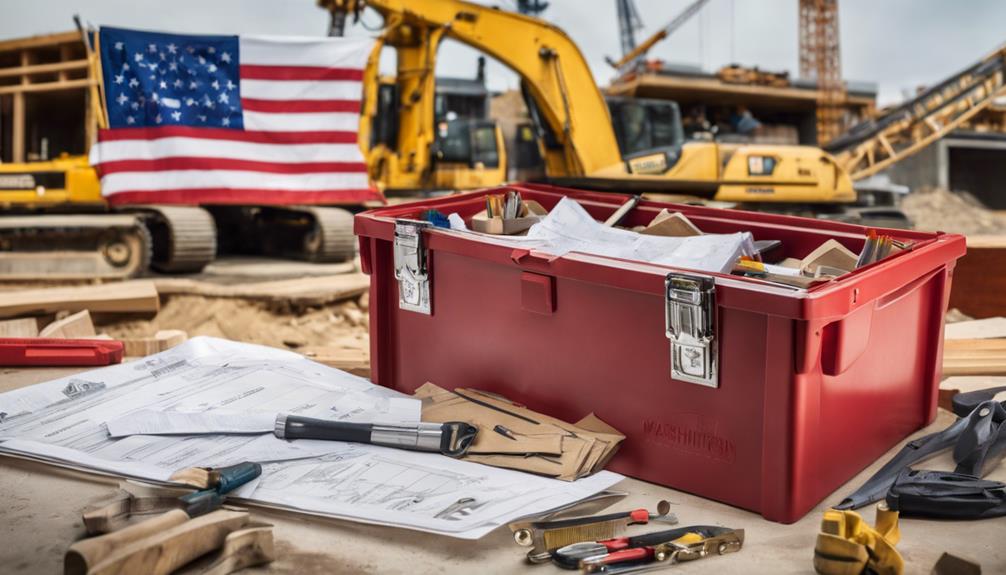If you're considering becoming a licensed contractor in Washington State, you'll need to understand the crucial role of the $12,000 bond. This bond isn't just a requirement; it's a vital consumer protection measure that can significantly impact your business's credibility. You might be wondering how the bonding process works and what it takes to meet eligibility requirements. Understanding these elements could make all the difference in your journey as a contractor. So, what steps do you need to take to ensure you're compliant and positioned for success?
Overview of Contractor Licensing

In Washington, obtaining a contractor license is a crucial step for anyone looking to operate legally in the construction industry. This license isn't just a formality; it signifies that you've met specific education and experience requirements, ensuring you're equipped to handle construction projects safely and effectively.
Additionally, securing a surety bond is typically necessary for contractors, as it provides financial security and protects against non-compliance with industry regulations.
To start the licensing process, you'll need to fill out an application with the Washington State Department of Labor & Industries. This application includes your personal information, business details, and proof of experience in the field.
Don't forget to provide any required documentation, like a business entity registration if you're operating under a company name.
Once your application is approved, you'll need to pass the appropriate trade exams relevant to your specialization. These exams test your knowledge of building codes, safety regulations, and best practices.
After passing the exams, you'll pay the necessary licensing fees to finalize your contractor license.
Importance of the ,000 Bond
A $12,000 bond is essential for contractors in Washington because it provides a safety net for consumers and ensures compliance with state regulations. This bond acts as a guarantee that you'll fulfill your contractual obligations and adhere to the laws governing your trade, similar to how Florida Surety Bonds serve as legal agreements ensuring obligations are met. If you fail to meet these obligations, the bond offers a means for consumers to seek compensation for any financial losses they may incur.
Moreover, having this bond enhances your credibility as a contractor. It shows potential clients that you're committed to professionalism and accountability. When clients see that you hold a bond, they're more likely to trust you with their projects, knowing they've some form of protection should things go awry.
Additionally, the bond helps you avoid legal issues. By maintaining compliance with state requirements, you minimize the risk of penalties or fines. This keeps your business running smoothly and allows you to focus on delivering quality work.
In essence, the $12,000 bond isn't just a regulatory requirement; it's a crucial element that safeguards your business and builds trust with your clients. Embracing this responsibility can lead to long-term success in the contracting industry.
Eligibility Requirements for Contractors

To qualify for a contractor license in Washington, you must meet specific eligibility requirements that ensure you're capable of delivering quality services.
First, you need to be at least 18 years old and a resident of Washington or have a registered business in the state. If you're operating as a sole proprietor, you must have a valid Social Security number or an Individual Taxpayer Identification Number (ITIN).
Next, you need to demonstrate relevant experience in the construction industry. This can include working under a licensed contractor or having hands-on experience that proves your skills.
You'll also need to show proof of completing the required pre-licensing education courses, which cover key topics like business practices and Washington's contractor laws.
Additionally, you must obtain a $12,000 surety bond and liability insurance to protect your clients and ensure compliance with state regulations.
Be prepared to provide any necessary documentation, including your work history and references, when applying for your license. Meeting these requirements not only helps you obtain your license but also sets a solid foundation for your contracting business.
Steps to Obtain a General Contractor License
Securing a general contractor license in Washington involves several key steps that streamline the process.
First, you'll need to complete a pre-licensing education course, which covers essential topics like building codes and safety regulations. After finishing the course, you'll need to gather required documents, including proof of experience and your identification.
Next, you'll submit your application to the Washington State Department of Labor and Industries (L&I). Be sure to include any necessary fees with your application.
Once submitted, L&I will review your application to ensure you meet all eligibility requirements. If everything checks out, you'll receive instructions for the next steps.
After your application is approved, you'll need to pass a business and law exam. Studying for this exam is crucial, as it covers important regulations and practices.
Once you pass, you'll pay the licensing fee and obtain your general contractor license.
Understanding the Bonding Process

After obtaining your general contractor license, understanding the bonding process is vital for operating legally and protecting your clients.
A bond is essentially a contract that guarantees your clients will be compensated if you fail to meet your obligations. It's a safety net for your customers, ensuring they've recourse should issues arise during a project.
Additionally, working with an experienced bonding team can streamline the process and provide valuable insights into the specific bonds required in your region.
To begin the bonding process, you'll need to choose a reliable surety company. They'll assess your financial stability, work history, and creditworthiness. This evaluation helps determine the bond amount you'll need and the premium you'll pay.
Remember, in Washington, the required bond amount for general contractors is $12,000.
Once you've selected a surety company, you'll fill out an application, providing necessary documentation like your business information and financial statements.
After approval, you'll pay the bond premium, typically a percentage of the total bond amount.
Once everything's in place, the surety company issues the bond, allowing you to operate legally.
Costs Associated With the Bond
When it comes to obtaining a contractor license bond in Washington, understanding the associated costs is crucial for budgeting your project expenses. The primary cost you'll encounter is the premium you pay for the bond, which typically ranges from 1% to 3% of the bond amount. For a $12,000 bond, this means you might pay between $120 and $360 annually.
Your premium depends on several factors, including your credit score, experience, and business history. If you have a strong financial background, you're likely to secure a lower rate. Additionally, some bonding companies may charge a one-time processing fee that could add to your initial outlay.
Keep in mind that while the bond itself is a recurring expense, you may also face other indirect costs, such as administrative fees or costs related to renewing the bond.
It's wise to shop around and compare quotes from different bonding companies to ensure you're getting the best deal. By being aware of these costs upfront, you can effectively plan your budget and avoid any unexpected financial surprises.
Implications of Bond Claims

Understanding the costs associated with a contractor license bond is just the beginning; it's equally important to grasp the implications of bond claims. When a claim is made against your bond, it signifies that someone believes you've failed to meet contractual obligations or violated regulations. This situation can lead to financial consequences, as the bond company will cover the claim initially but will seek reimbursement from you later.
Moreover, multiple claims can tarnish your professional reputation and make it harder for you to obtain future bonds or licenses. Insurers may view you as a higher risk, resulting in increased premiums or even denial of coverage. You might also face legal disputes, which can drain your time and resources.
It's crucial to address any claims promptly and thoroughly to mitigate potential fallout. Communication with the claimant can sometimes resolve issues before they escalate.
Ultimately, understanding the implications of bond claims helps you navigate the challenges of being a contractor while protecting your business interests and maintaining your credibility in the industry.
Maintaining Compliance and Good Standing
Maintaining compliance and good standing is essential for any contractor looking to thrive in the industry. To achieve this, you need to stay on top of your licensing requirements, ensure your bond is current, and adhere to local regulations.
Regularly review your contractor license and renew it on time; failing to do so can lead to penalties or even loss of your ability to operate.
You should also keep accurate records of your projects and financial dealings. This not only helps you manage your business but also prepares you for any audits or inspections.
Additionally, consider taking continuing education courses to stay informed about industry best practices and regulatory changes.
Pay close attention to customer feedback and resolve disputes promptly. A strong reputation can be your best asset, while unresolved issues can lead to complaints that impact your standing.
Lastly, maintain a good relationship with your surety bond provider. Communicate any changes in your business or financial status, as this can affect your bond coverage.
Conclusion
In conclusion, securing your contractor license in Washington isn't just about meeting requirements; it's about building trust with your clients. The $12,000 bond is a crucial part of this process, protecting both you and your customers. By understanding the bonding process and maintaining compliance, you can enhance your credibility in the industry. Stay informed and proactive, and you'll set yourself up for success in your contracting journey. Don't underestimate the importance of that bond!

